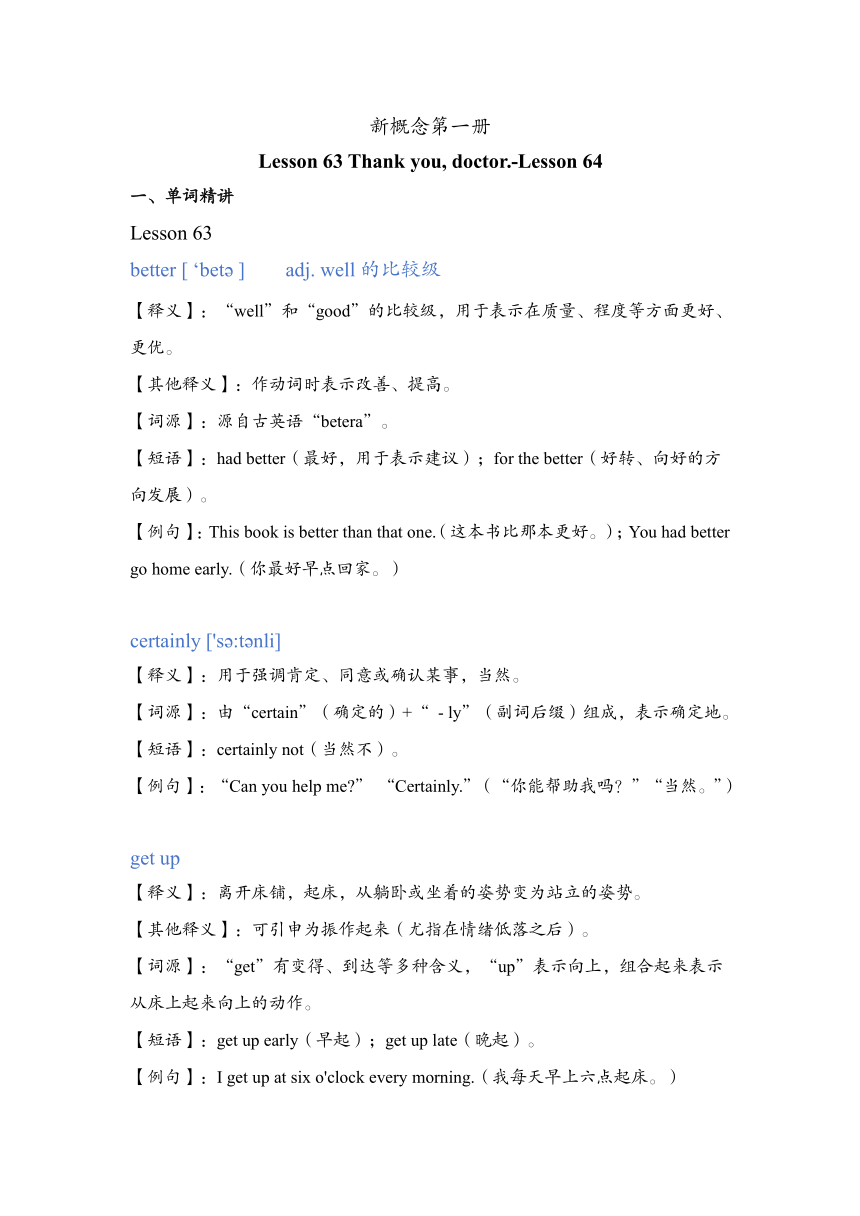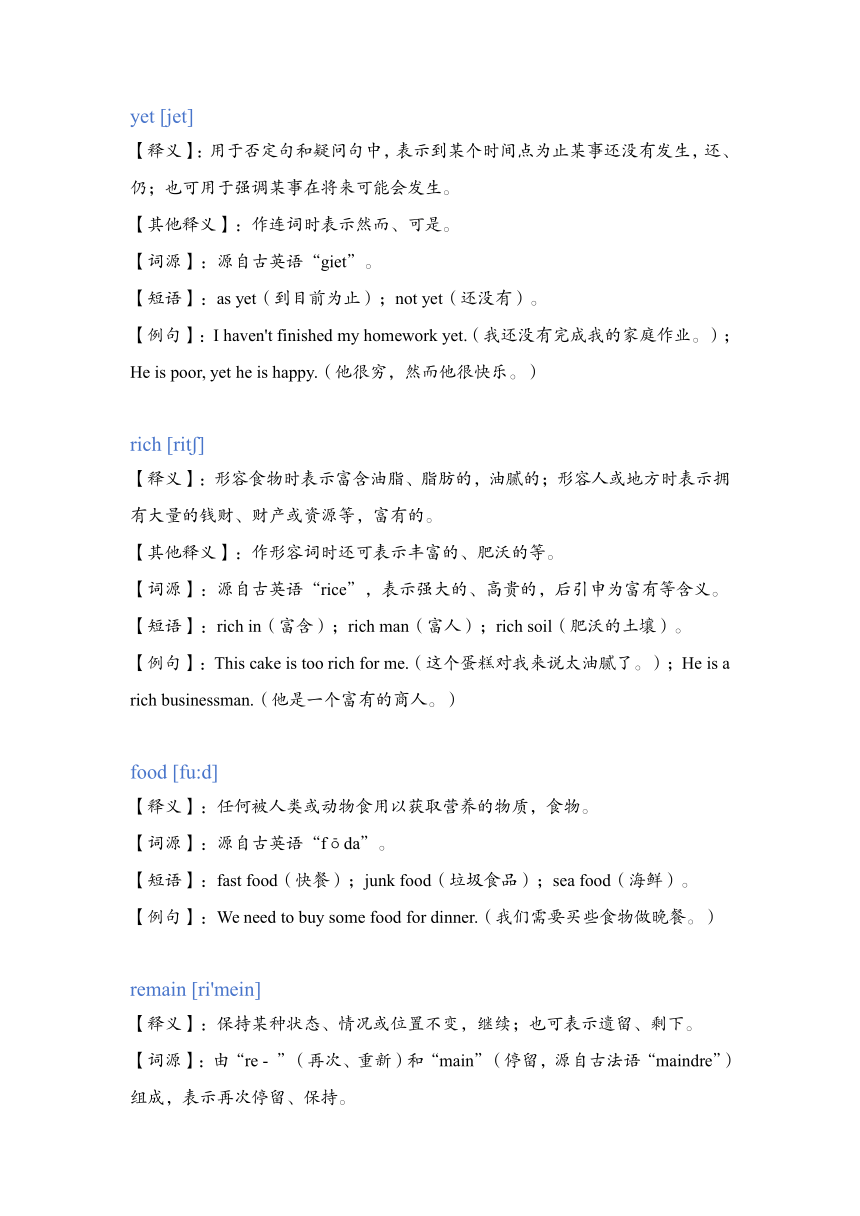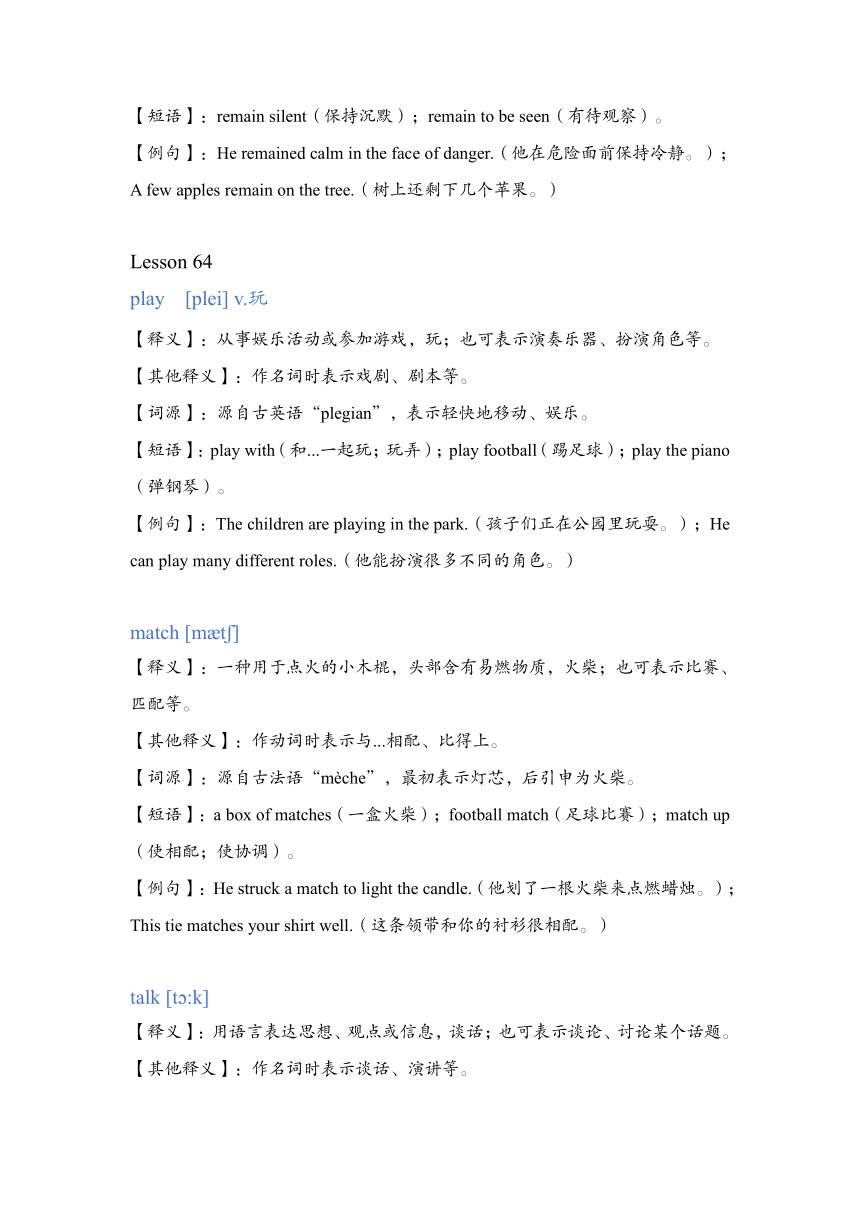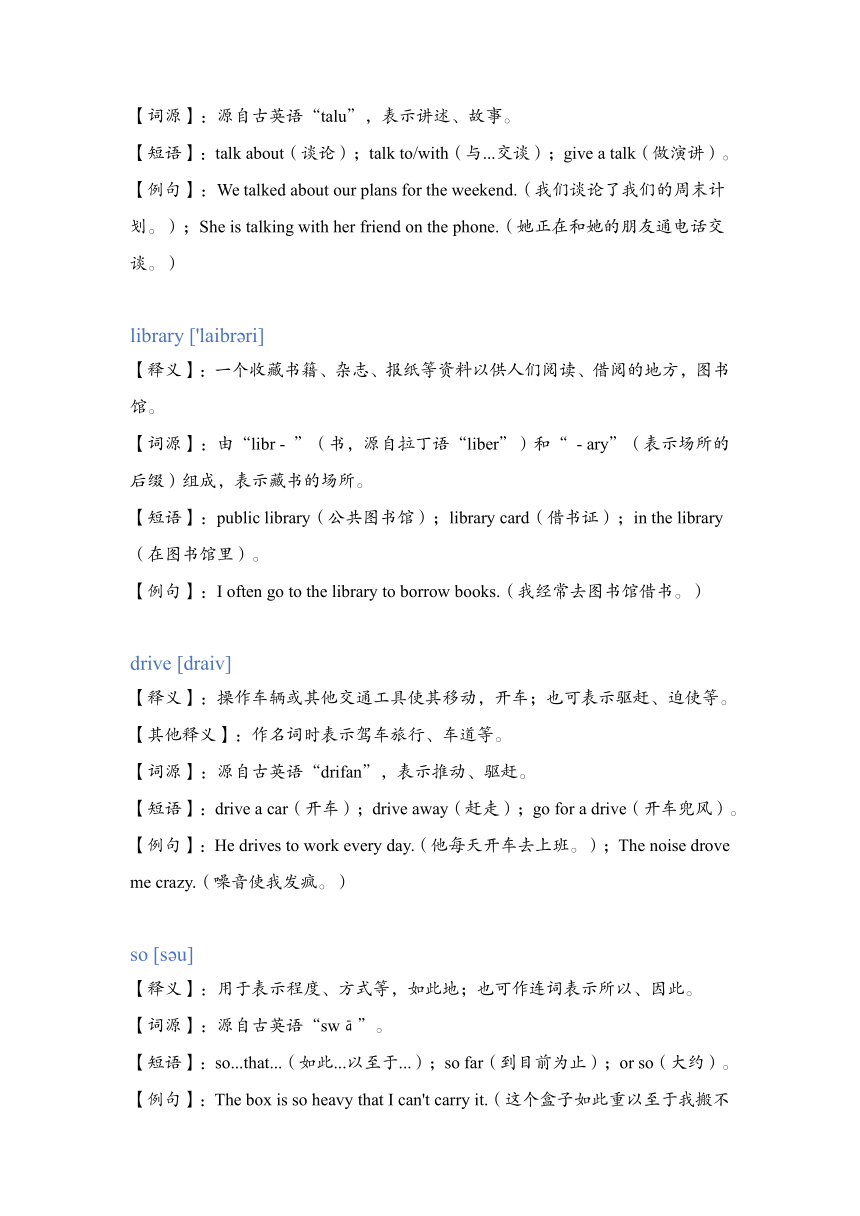新概念第一册Lesson 63 Thank you, doctor.-Lesson 64讲义
文档属性
| 名称 | 新概念第一册Lesson 63 Thank you, doctor.-Lesson 64讲义 |  | |
| 格式 | docx | ||
| 文件大小 | 175.4KB | ||
| 资源类型 | 教案 | ||
| 版本资源 | 新概念英语 | ||
| 科目 | 英语 | ||
| 更新时间 | 2024-12-03 09:46:36 | ||
图片预览




文档简介
新概念第一册
Lesson 63 Thank you, doctor.-Lesson 64
单词精讲
Lesson 63
better [ ‘bet ] adj. well的比较级
【释义】:“well”和“good”的比较级,用于表示在质量、程度等方面更好、更优。
【其他释义】:作动词时表示改善、提高。
【词源】:源自古英语“betera”。
【短语】:had better(最好,用于表示建议);for the better(好转、向好的方向发展)。
【例句】:This book is better than that one.(这本书比那本更好。);You had better go home early.(你最好早点回家。)
certainly ['s :t nli]
【释义】:用于强调肯定、同意或确认某事,当然。
【词源】:由“certain”(确定的)+“ - ly”(副词后缀)组成,表示确定地。
【短语】:certainly not(当然不)。
【例句】:“Can you help me ” “Certainly.”(“你能帮助我吗?”“当然。”)
get up
【释义】:离开床铺,起床,从躺卧或坐着的姿势变为站立的姿势。
【其他释义】:可引申为振作起来(尤指在情绪低落之后)。
【词源】:“get”有变得、到达等多种含义,“up”表示向上,组合起来表示从床上起来向上的动作。
【短语】:get up early(早起);get up late(晚起)。
【例句】:I get up at six o'clock every morning.(我每天早上六点起床。)
yet [jet]
【释义】:用于否定句和疑问句中,表示到某个时间点为止某事还没有发生,还、仍;也可用于强调某事在将来可能会发生。
【其他释义】:作连词时表示然而、可是。
【词源】:源自古英语“giet”。
【短语】:as yet(到目前为止);not yet(还没有)。
【例句】:I haven't finished my homework yet.(我还没有完成我的家庭作业。);He is poor, yet he is happy.(他很穷,然而他很快乐。)
rich [rit ]
【释义】:形容食物时表示富含油脂、脂肪的,油腻的;形容人或地方时表示拥有大量的钱财、财产或资源等,富有的。
【其他释义】:作形容词时还可表示丰富的、肥沃的等。
【词源】:源自古英语“rice”,表示强大的、高贵的,后引申为富有等含义。
【短语】:rich in(富含);rich man(富人);rich soil(肥沃的土壤)。
【例句】:This cake is too rich for me.(这个蛋糕对我来说太油腻了。);He is a rich businessman.(他是一个富有的商人。)
food [fu:d]
【释义】:任何被人类或动物食用以获取营养的物质,食物。
【词源】:源自古英语“fōda”。
【短语】:fast food(快餐);junk food(垃圾食品);sea food(海鲜)。
【例句】:We need to buy some food for dinner.(我们需要买些食物做晚餐。)
remain [ri'mein]
【释义】:保持某种状态、情况或位置不变,继续;也可表示遗留、剩下。
【词源】:由“re - ”(再次、重新)和“main”(停留,源自古法语“maindre”)组成,表示再次停留、保持。
【短语】:remain silent(保持沉默);remain to be seen(有待观察)。
【例句】:He remained calm in the face of danger.(他在危险面前保持冷静。);A few apples remain on the tree.(树上还剩下几个苹果。)
Lesson 64
play [plei] v.玩
【释义】:从事娱乐活动或参加游戏,玩;也可表示演奏乐器、扮演角色等。
【其他释义】:作名词时表示戏剧、剧本等。
【词源】:源自古英语“plegian”,表示轻快地移动、娱乐。
【短语】:play with(和...一起玩;玩弄);play football(踢足球);play the piano(弹钢琴)。
【例句】:The children are playing in the park.(孩子们正在公园里玩耍。);He can play many different roles.(他能扮演很多不同的角色。)
match [m t ]
【释义】:一种用于点火的小木棍,头部含有易燃物质,火柴;也可表示比赛、匹配等。
【其他释义】:作动词时表示与...相配、比得上。
【词源】:源自古法语“mèche”,最初表示灯芯,后引申为火柴。
【短语】:a box of matches(一盒火柴);football match(足球比赛);match up(使相配;使协调)。
【例句】:He struck a match to light the candle.(他划了一根火柴来点燃蜡烛。);This tie matches your shirt well.(这条领带和你的衬衫很相配。)
talk [t :k]
【释义】:用语言表达思想、观点或信息,谈话;也可表示谈论、讨论某个话题。
【其他释义】:作名词时表示谈话、演讲等。
【词源】:源自古英语“talu”,表示讲述、故事。
【短语】:talk about(谈论);talk to/with(与...交谈);give a talk(做演讲)。
【例句】:We talked about our plans for the weekend.(我们谈论了我们的周末计划。);She is talking with her friend on the phone.(她正在和她的朋友通电话交谈。)
library ['laibr ri]
【释义】:一个收藏书籍、杂志、报纸等资料以供人们阅读、借阅的地方,图书馆。
【词源】:由“libr - ”(书,源自拉丁语“liber”)和“ - ary”(表示场所的后缀)组成,表示藏书的场所。
【短语】:public library(公共图书馆);library card(借书证);in the library(在图书馆里)。
【例句】:I often go to the library to borrow books.(我经常去图书馆借书。)
drive [draiv]
【释义】:操作车辆或其他交通工具使其移动,开车;也可表示驱赶、迫使等。
【其他释义】:作名词时表示驾车旅行、车道等。
【词源】:源自古英语“drifan”,表示推动、驱赶。
【短语】:drive a car(开车);drive away(赶走);go for a drive(开车兜风)。
【例句】:He drives to work every day.(他每天开车去上班。);The noise drove me crazy.(噪音使我发疯。)
so [s u]
【释义】:用于表示程度、方式等,如此地;也可作连词表示所以、因此。
【词源】:源自古英语“swā”。
【短语】:so...that...(如此...以至于...);so far(到目前为止);or so(大约)。
【例句】:The box is so heavy that I can't carry it.(这个盒子如此重以至于我搬不动它。);It was raining, so we stayed at home.(正在下雨,所以我们呆在家里。)
quickly ['kwikli]
【释义】:以快的速度或短的时间完成某事,快地,迅速地。
【词源】:由“quick”(快的)+“ - ly”(副词后缀)组成。
【短语】:as quickly as possible(尽可能快地)。
【例句】:He ran quickly to catch the bus.(他跑得很快去赶公共汽车。)
lean out of
【释义】:将身体的一部分探出(如探出窗外等),身体探出。
【词源】:“lean”表示倾斜、倚靠,“out of”表示从...出来,组合起来表示从某个空间倾斜着出来(身体探出)。
【短语】:lean out of the window(探出窗外)。
【例句】:Don't lean out of the car window while it is moving.(汽车行驶时不要探出车窗。)
break [breik]
【释义】:使某物破碎、断裂或损坏,打破;也可表示违反、中断等。
【其他释义】:作名词时表示休息、中断。
【词源】:源自古英语“brecan”。
【短语】:break the glass(打破玻璃);break the law(违反法律);have a break(休息一下)。
【例句】:He broke his leg in the accident.(他在事故中摔断了腿。);Let's have a break after working for an hour.(工作一个小时后让我们休息一下。)
重点句型
表示禁令的don't与mustn't
用mustn't表示"禁止"或"不许可",语气比较强烈。
例句:
1.You are better now,but you mustn't get up yet.
2.Don't take this medicine!
You mustn't take this medicine!
3.Don't call the doctor!
You mustn't call the doctor!
4.Don't talk in the library!
You mustn't talk in the library!
5.Don't lean out of the window!
You mustn't lean out of the window
each,every, all ,both的用法及区别
(1)all, both同属前位限定词,但all可以与三类名词搭配,both只能与复数可数名词搭配,从意义上讲both指两者,all指三者或三者以上。
All children can be naughty sometimes.
Both cats are asleep.
(2)all 和every从意义上十分相近,都用来泛指人或物,然而两者各自与名词搭配的类别不同,every只能与单数可数名词连用。
All Mondays are horrible.(= Every Monday is horrible. )
(3)all后可以跟the或this, my等限定词,而every却不行。
(4)every和each同属中位限定词,都可与单数名词连用,且意义相近,表示‘每个’,然而every和each并不完全一样,every强调整体概括,each则表示个别概念。例如:
Each day is better than the one before.
一天比一天好。
Every player was in good form.
每个运动员都处于最佳状态。
(5)each可以指两个或两个以上的人或东西,every却不能指两个,只能指三个以上的数量。
情态动词的否定
(1)cannot或can’t表示“不能够”“不可以”和“不可能”。如:
1.I cannot answer your question at present.我目前无法回答你的问题。
2.—Can I leave now?我可以走了吗?
—No, I am afraid you can’t.对不起,恐怕不行
(2)另外,cannot还用于固定习语中。如:
She cannot help laughing. 她禁不住笑了。
You cannot be too careful. 你越小心越好。
(3)may not 表示“不可以”“不可能”如:
1.—May I turn the radio on?我可以打开收音机吗?
—No, you may not.不,不可以。
2.She is busy these days. She may not go to the concert tonight. 近来她很忙,今晚她可能不来听音乐会了。
(4)must not或mustn’t 表示“ 不应该”“不可以”和“禁止”。如:
1.—May I take this book out of the reading room?我可以把这本书拿出阅览室吗?
—No, you mustn’t. 不,不可以。
2.—Can I park my car here?我可以在这儿停车吗?
—No, cars mustn’t be parked here.不行,这里禁止停车。
(5)need not或 needn’t 表示“不必”
如:
—Must I finish the work at once?我必须马上完成这工作吗?
—No, you needn’t(don’t have to).不,你不必。
(6)我们要特别注意“情态动词的否定形式+完成时”的表达。
can’t have done sth.表示“不大可能做某事”,
needn’t have done sth.表示“本来没有必要做某事但做了”,
oughtn’t to或shouldn’t have done sth.表示“本不应该做某事但做了”。
the other,another, others的用法及区别
(1)指单数时的用法:若泛指用another,若特指用 the other。
如:Give me another (one). 另外给我一个。
Shut the other eye, please. 请把另一只眼睛也闭上。
(2)指复数时的用法:若泛指用 other(后接复数名词),若特指用the other(后接复数名词)。如:
There are other ways of doing it. 做这事还有其他的办法。
Where have the other students gone 其他学生都到哪里去了?
(3)others永远表示复数意义(且其后不能再接名词)。其用法大致相当于 “other+复数名词”,同样地 the others 大致相当于“the other+复数名词”。如:
Other people [Others] may not think that way. 别的人可能不这样想。He is cleverer than the others [the other students] in her class. 他比班上其他学生聪明。
(4)another一般只能表单数,且其后接名词也只能接单数名词。但是若其后有数词或 few 修饰时,则也可接复数名词。
如:
We need another few chairs. 我们还需要几把椅子。
In another two weeks it‘ll be finished. 再过两个星期就可做完了。
(5)与 some连用与 some 对比使用时,用 others(此时与 some 同义)。
如:Some say yes, and others say no. 有人说对,有人说不对。
三、课文精讲
1.How's Jimmy today
How's=How is
2.Better.Thank you, Doctor.
better是good和well的比较级
good/well-better-best
3.You look very well,Jimmy.
You look...你看起来...
4.You are better now,but you mustn't get up yet.
mustn't= must not
get up 起床
5.The boy mustn't go to school yet,Mrs.Williams...
not yet 还没有
6.And he mustn't eat rich food.
rich food 油腻的食物
light food 清淡的食物
Lesson 63 Thank you, doctor.-Lesson 64
单词精讲
Lesson 63
better [ ‘bet ] adj. well的比较级
【释义】:“well”和“good”的比较级,用于表示在质量、程度等方面更好、更优。
【其他释义】:作动词时表示改善、提高。
【词源】:源自古英语“betera”。
【短语】:had better(最好,用于表示建议);for the better(好转、向好的方向发展)。
【例句】:This book is better than that one.(这本书比那本更好。);You had better go home early.(你最好早点回家。)
certainly ['s :t nli]
【释义】:用于强调肯定、同意或确认某事,当然。
【词源】:由“certain”(确定的)+“ - ly”(副词后缀)组成,表示确定地。
【短语】:certainly not(当然不)。
【例句】:“Can you help me ” “Certainly.”(“你能帮助我吗?”“当然。”)
get up
【释义】:离开床铺,起床,从躺卧或坐着的姿势变为站立的姿势。
【其他释义】:可引申为振作起来(尤指在情绪低落之后)。
【词源】:“get”有变得、到达等多种含义,“up”表示向上,组合起来表示从床上起来向上的动作。
【短语】:get up early(早起);get up late(晚起)。
【例句】:I get up at six o'clock every morning.(我每天早上六点起床。)
yet [jet]
【释义】:用于否定句和疑问句中,表示到某个时间点为止某事还没有发生,还、仍;也可用于强调某事在将来可能会发生。
【其他释义】:作连词时表示然而、可是。
【词源】:源自古英语“giet”。
【短语】:as yet(到目前为止);not yet(还没有)。
【例句】:I haven't finished my homework yet.(我还没有完成我的家庭作业。);He is poor, yet he is happy.(他很穷,然而他很快乐。)
rich [rit ]
【释义】:形容食物时表示富含油脂、脂肪的,油腻的;形容人或地方时表示拥有大量的钱财、财产或资源等,富有的。
【其他释义】:作形容词时还可表示丰富的、肥沃的等。
【词源】:源自古英语“rice”,表示强大的、高贵的,后引申为富有等含义。
【短语】:rich in(富含);rich man(富人);rich soil(肥沃的土壤)。
【例句】:This cake is too rich for me.(这个蛋糕对我来说太油腻了。);He is a rich businessman.(他是一个富有的商人。)
food [fu:d]
【释义】:任何被人类或动物食用以获取营养的物质,食物。
【词源】:源自古英语“fōda”。
【短语】:fast food(快餐);junk food(垃圾食品);sea food(海鲜)。
【例句】:We need to buy some food for dinner.(我们需要买些食物做晚餐。)
remain [ri'mein]
【释义】:保持某种状态、情况或位置不变,继续;也可表示遗留、剩下。
【词源】:由“re - ”(再次、重新)和“main”(停留,源自古法语“maindre”)组成,表示再次停留、保持。
【短语】:remain silent(保持沉默);remain to be seen(有待观察)。
【例句】:He remained calm in the face of danger.(他在危险面前保持冷静。);A few apples remain on the tree.(树上还剩下几个苹果。)
Lesson 64
play [plei] v.玩
【释义】:从事娱乐活动或参加游戏,玩;也可表示演奏乐器、扮演角色等。
【其他释义】:作名词时表示戏剧、剧本等。
【词源】:源自古英语“plegian”,表示轻快地移动、娱乐。
【短语】:play with(和...一起玩;玩弄);play football(踢足球);play the piano(弹钢琴)。
【例句】:The children are playing in the park.(孩子们正在公园里玩耍。);He can play many different roles.(他能扮演很多不同的角色。)
match [m t ]
【释义】:一种用于点火的小木棍,头部含有易燃物质,火柴;也可表示比赛、匹配等。
【其他释义】:作动词时表示与...相配、比得上。
【词源】:源自古法语“mèche”,最初表示灯芯,后引申为火柴。
【短语】:a box of matches(一盒火柴);football match(足球比赛);match up(使相配;使协调)。
【例句】:He struck a match to light the candle.(他划了一根火柴来点燃蜡烛。);This tie matches your shirt well.(这条领带和你的衬衫很相配。)
talk [t :k]
【释义】:用语言表达思想、观点或信息,谈话;也可表示谈论、讨论某个话题。
【其他释义】:作名词时表示谈话、演讲等。
【词源】:源自古英语“talu”,表示讲述、故事。
【短语】:talk about(谈论);talk to/with(与...交谈);give a talk(做演讲)。
【例句】:We talked about our plans for the weekend.(我们谈论了我们的周末计划。);She is talking with her friend on the phone.(她正在和她的朋友通电话交谈。)
library ['laibr ri]
【释义】:一个收藏书籍、杂志、报纸等资料以供人们阅读、借阅的地方,图书馆。
【词源】:由“libr - ”(书,源自拉丁语“liber”)和“ - ary”(表示场所的后缀)组成,表示藏书的场所。
【短语】:public library(公共图书馆);library card(借书证);in the library(在图书馆里)。
【例句】:I often go to the library to borrow books.(我经常去图书馆借书。)
drive [draiv]
【释义】:操作车辆或其他交通工具使其移动,开车;也可表示驱赶、迫使等。
【其他释义】:作名词时表示驾车旅行、车道等。
【词源】:源自古英语“drifan”,表示推动、驱赶。
【短语】:drive a car(开车);drive away(赶走);go for a drive(开车兜风)。
【例句】:He drives to work every day.(他每天开车去上班。);The noise drove me crazy.(噪音使我发疯。)
so [s u]
【释义】:用于表示程度、方式等,如此地;也可作连词表示所以、因此。
【词源】:源自古英语“swā”。
【短语】:so...that...(如此...以至于...);so far(到目前为止);or so(大约)。
【例句】:The box is so heavy that I can't carry it.(这个盒子如此重以至于我搬不动它。);It was raining, so we stayed at home.(正在下雨,所以我们呆在家里。)
quickly ['kwikli]
【释义】:以快的速度或短的时间完成某事,快地,迅速地。
【词源】:由“quick”(快的)+“ - ly”(副词后缀)组成。
【短语】:as quickly as possible(尽可能快地)。
【例句】:He ran quickly to catch the bus.(他跑得很快去赶公共汽车。)
lean out of
【释义】:将身体的一部分探出(如探出窗外等),身体探出。
【词源】:“lean”表示倾斜、倚靠,“out of”表示从...出来,组合起来表示从某个空间倾斜着出来(身体探出)。
【短语】:lean out of the window(探出窗外)。
【例句】:Don't lean out of the car window while it is moving.(汽车行驶时不要探出车窗。)
break [breik]
【释义】:使某物破碎、断裂或损坏,打破;也可表示违反、中断等。
【其他释义】:作名词时表示休息、中断。
【词源】:源自古英语“brecan”。
【短语】:break the glass(打破玻璃);break the law(违反法律);have a break(休息一下)。
【例句】:He broke his leg in the accident.(他在事故中摔断了腿。);Let's have a break after working for an hour.(工作一个小时后让我们休息一下。)
重点句型
表示禁令的don't与mustn't
用mustn't表示"禁止"或"不许可",语气比较强烈。
例句:
1.You are better now,but you mustn't get up yet.
2.Don't take this medicine!
You mustn't take this medicine!
3.Don't call the doctor!
You mustn't call the doctor!
4.Don't talk in the library!
You mustn't talk in the library!
5.Don't lean out of the window!
You mustn't lean out of the window
each,every, all ,both的用法及区别
(1)all, both同属前位限定词,但all可以与三类名词搭配,both只能与复数可数名词搭配,从意义上讲both指两者,all指三者或三者以上。
All children can be naughty sometimes.
Both cats are asleep.
(2)all 和every从意义上十分相近,都用来泛指人或物,然而两者各自与名词搭配的类别不同,every只能与单数可数名词连用。
All Mondays are horrible.(= Every Monday is horrible. )
(3)all后可以跟the或this, my等限定词,而every却不行。
(4)every和each同属中位限定词,都可与单数名词连用,且意义相近,表示‘每个’,然而every和each并不完全一样,every强调整体概括,each则表示个别概念。例如:
Each day is better than the one before.
一天比一天好。
Every player was in good form.
每个运动员都处于最佳状态。
(5)each可以指两个或两个以上的人或东西,every却不能指两个,只能指三个以上的数量。
情态动词的否定
(1)cannot或can’t表示“不能够”“不可以”和“不可能”。如:
1.I cannot answer your question at present.我目前无法回答你的问题。
2.—Can I leave now?我可以走了吗?
—No, I am afraid you can’t.对不起,恐怕不行
(2)另外,cannot还用于固定习语中。如:
She cannot help laughing. 她禁不住笑了。
You cannot be too careful. 你越小心越好。
(3)may not 表示“不可以”“不可能”如:
1.—May I turn the radio on?我可以打开收音机吗?
—No, you may not.不,不可以。
2.She is busy these days. She may not go to the concert tonight. 近来她很忙,今晚她可能不来听音乐会了。
(4)must not或mustn’t 表示“ 不应该”“不可以”和“禁止”。如:
1.—May I take this book out of the reading room?我可以把这本书拿出阅览室吗?
—No, you mustn’t. 不,不可以。
2.—Can I park my car here?我可以在这儿停车吗?
—No, cars mustn’t be parked here.不行,这里禁止停车。
(5)need not或 needn’t 表示“不必”
如:
—Must I finish the work at once?我必须马上完成这工作吗?
—No, you needn’t(don’t have to).不,你不必。
(6)我们要特别注意“情态动词的否定形式+完成时”的表达。
can’t have done sth.表示“不大可能做某事”,
needn’t have done sth.表示“本来没有必要做某事但做了”,
oughtn’t to或shouldn’t have done sth.表示“本不应该做某事但做了”。
the other,another, others的用法及区别
(1)指单数时的用法:若泛指用another,若特指用 the other。
如:Give me another (one). 另外给我一个。
Shut the other eye, please. 请把另一只眼睛也闭上。
(2)指复数时的用法:若泛指用 other(后接复数名词),若特指用the other(后接复数名词)。如:
There are other ways of doing it. 做这事还有其他的办法。
Where have the other students gone 其他学生都到哪里去了?
(3)others永远表示复数意义(且其后不能再接名词)。其用法大致相当于 “other+复数名词”,同样地 the others 大致相当于“the other+复数名词”。如:
Other people [Others] may not think that way. 别的人可能不这样想。He is cleverer than the others [the other students] in her class. 他比班上其他学生聪明。
(4)another一般只能表单数,且其后接名词也只能接单数名词。但是若其后有数词或 few 修饰时,则也可接复数名词。
如:
We need another few chairs. 我们还需要几把椅子。
In another two weeks it‘ll be finished. 再过两个星期就可做完了。
(5)与 some连用与 some 对比使用时,用 others(此时与 some 同义)。
如:Some say yes, and others say no. 有人说对,有人说不对。
三、课文精讲
1.How's Jimmy today
How's=How is
2.Better.Thank you, Doctor.
better是good和well的比较级
good/well-better-best
3.You look very well,Jimmy.
You look...你看起来...
4.You are better now,but you mustn't get up yet.
mustn't= must not
get up 起床
5.The boy mustn't go to school yet,Mrs.Williams...
not yet 还没有
6.And he mustn't eat rich food.
rich food 油腻的食物
light food 清淡的食物
同课章节目录
